一般现在时复习
一般现在时总复习
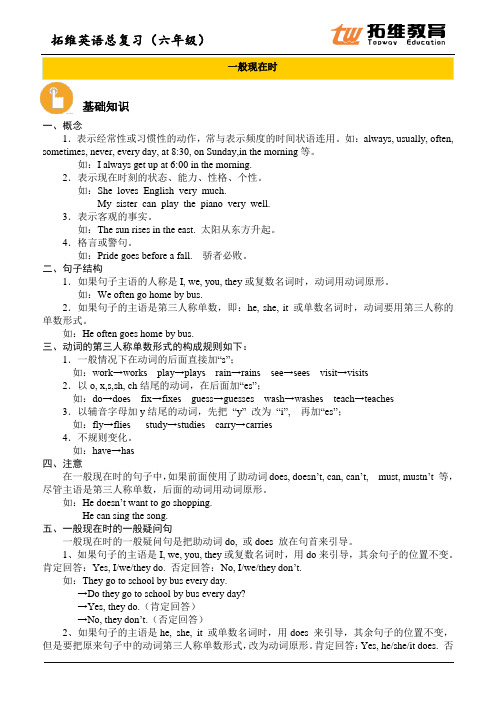
一、概念1.表示经常性或习惯性的动作,常与表示频度的时间状语连用。
如:always, usually, often, sometimes, never, every day, at 8:30, on Sunday,in the morning等。
如:I always get up at 6:00 in the morning.2.表示现在时刻的状态、能力、性格、个性。
如:She loves English very much.My sister can play the piano very well.3.表示客观的事实。
如:The sun rises in the east. 太阳从东方升起。
4.格言或警句。
如:Pride goes before a fall.骄者必败。
二、句子结构1.如果句子主语的人称是I, we, you, they或复数名词时,动词用动词原形。
如:We often go home by bus.2.如果句子的主语是第三人称单数,即:he, she, it 或单数名词时,动词要用第三人称的单数形式。
如:He often goes home by bus.三、动词的第三人称单数形式的构成规则如下:1.一般情况下在动词的后面直接加“s”;如:work→works play→plays rain→rains see→sees visit→visits2.以o, x,s,sh, ch结尾的动词,在后面加“es”;如:do→does fix→fixes guess→guesses wash→washes teach→teaches3.以辅音字母加y结尾的动词,先把“y”改为“i”, 再加“es”;如:fly→flies study→studies carry→carries4.不规则变化。
如:have→has四、注意在一般现在时的句子中,如果前面使用了助动词does, doesn’t, can, can’t, must, mustn’t 等,尽管主语是第三人称单数,后面的动词用动词原形。
译林版小学英语四种时态复习-附练习及答案
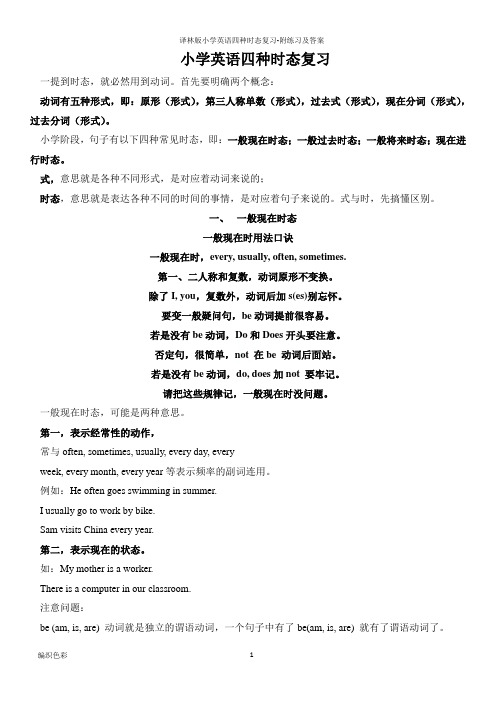
小学英语四种时态复习一提到时态,就必然用到动词。
首先要明确两个概念:动词有五种形式,即:原形(形式),第三人称单数(形式),过去式(形式),现在分词(形式),过去分词(形式)。
小学阶段,句子有以下四种常见时态,即:一般现在时态;一般过去时态;一般将来时态;现在进行时态。
式,意思就是各种不同形式,是对应着动词来说的;时态,意思就是表达各种不同的时间的事情,是对应着句子来说的。
式与时,先搞懂区别。
一、一般现在时态一般现在时用法口诀一般现在时,every, usually, often, sometimes.第一、二人称和复数,动词原形不变换。
除了I, you,复数外,动词后加s(es)别忘怀。
要变一般疑问句,be动词提前很容易。
若是没有be动词,Do和Does开头要注意。
否定句,很简单,not 在be 动词后面站。
若是没有be动词,do, does加not 要牢记。
请把这些规律记,一般现在时没问题。
一般现在时态,可能是两种意思。
第一,表示经常性的动作,常与often, sometimes, usually, every day, everyweek, every month, every year等表示频率的副词连用。
例如:He often goes swimming in summer.I usually go to work by bike.Sam visits China every year.第二,表示现在的状态。
如:My mother is a worker.There is a computer in our classroom.注意问题:be (am, is, are) 动词就是独立的谓语动词,一个句子中有了be(am, is, are) 就有了谓语动词了。
句子中不能同时出现两个谓语动词。
不少同学经常出这样的错误:The boy is often eats hamburgers.(错)应当改为:The boy often eats hamburgers.二、现在进行时态正在进行时态口诀现在分词用途多,进行时态不用说。
一般现在时句型转换复习进程
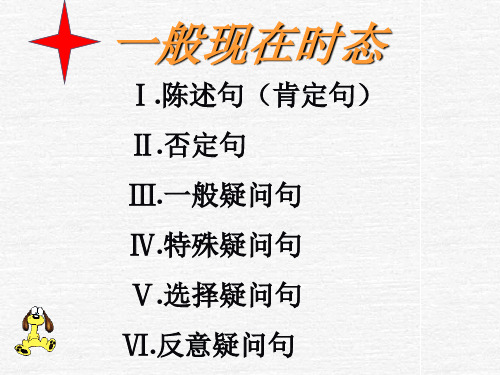
请把下列句子变成否定句和疑问句。 • The sun rises in the east.
The sun doesn’t rise in the east. Does the sun rise in the east?
• 2.Tom gets up at six in the morning.
Tom doesn’t get up at six in the morning. Does Tom get up at six in the morning?
We are friends.
Are you friends?
2.对于实意动词,疑问句要求是:当主语是 I/we/you/they/复数名词时,句子前面加Do; 当主语是he/she/it/单数名词/不可数名词时, 句前加Does ,并把动词变成动词原形。第 一人(I/we) 称换第二人称(you)。
1.Who goes to school every day by bike?
2.What does Tom do every day by bike ?
3.How does Tom go to school every day?
结束语
谢谢大家聆听!!!
18
1.对于be 动词,疑问句要求把be 提 前,第一人称(I/we)变成第二人称, 随之am变成are.
I am a teacher. 疑
You are a worker. 问
He is a student. 句
Are you a teacher? Are you a worker? Is he a student?
when
Does he get up when in the morning? When does he get up in the morning?
【英语】一般现在时专题复习
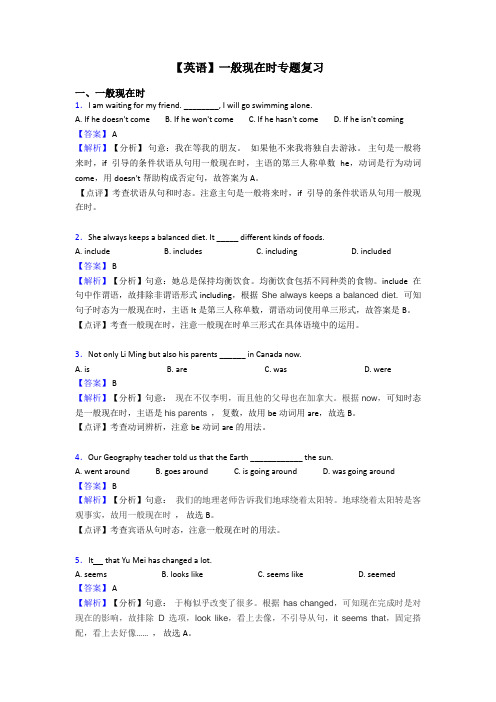
【英语】一般现在时专题复习一、一般现在时1.I am waiting for my friend. ________, I will go swimming alone.A. If he doesn't comeB. If he won't comeC. If he hasn't comeD. If he isn't coming 【答案】 A【解析】【分析】句意:我在等我的朋友。
如果他不来我将独自去游泳。
主句是一般将来时,if引导的条件状语从句用一般现在时,主语的第三人称单数he,动词是行为动词come,用doesn't帮助构成否定句,故答案为A。
【点评】考查状语从句和时态。
注意主句是一般将来时,if引导的条件状语从句用一般现在时。
2.She always keeps a balanced diet. It _____ different kinds of foods.A. includeB. includesC. includingD. included【答案】 B【解析】【分析】句意:她总是保持均衡饮食。
均衡饮食包括不同种类的食物。
include在句中作谓语,故排除非谓语形式including,根据She always keeps a balanced diet.可知句子时态为一般现在时,主语It是第三人称单数,谓语动词使用单三形式,故答案是B。
【点评】考查一般现在时,注意一般现在时单三形式在具体语境中的运用。
3.Not only Li Ming but also his parents ______ in Canada now.A. isB. areC. wasD. were【答案】 B【解析】【分析】句意:现在不仅李明,而且他的父母也在加拿大。
根据now,可知时态是一般现在时,主语是his parents,复数,故用be动词用are,故选B。
【点评】考查动词辨析,注意be动词are的用法。
一般现在时确定用
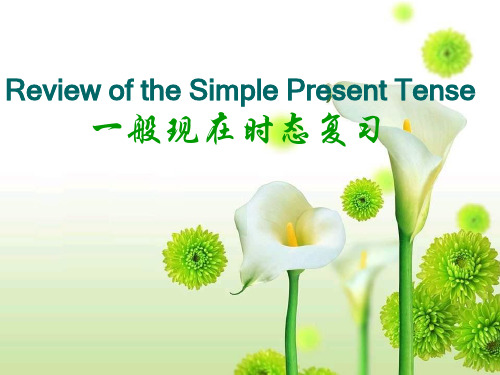
8 _____ your teacher _____(help) you learn math?
9 _____ Bill _____(do) his homework every day? 10 How many lessons ______ your classmate _____(have) on Monday? 11 What time_____ his mother____ (do) the housework? 12 What _____ he usually _____(do) after school?
1 I speak English.(变成一般疑问句并作肯定回答)
2 He speaks Chinese.(变成一般疑问句并作否定回答) 3 Jack likes playing computer.(变成一般疑问句并 作肯定回答) 4 We usually go to school by bus.(变成一般疑问 句并作否定回答)
1 We often _____(play) in the playground. 2 They _____(have) the same hobby. 3 Daniel and Tommy _____(be) in Class One. 4 She and I ______(take) a walk together every morning. 5You always ______(do) your homework well. 6 We often _____(not play) in the playground. 7 They _____(not have) the same hobby. 8 Daniel and Tommy _____(not be) in Class One.
考点11 一般现在时-备战2023年中考英语一轮复习考点帮(全国通用)(解析版)
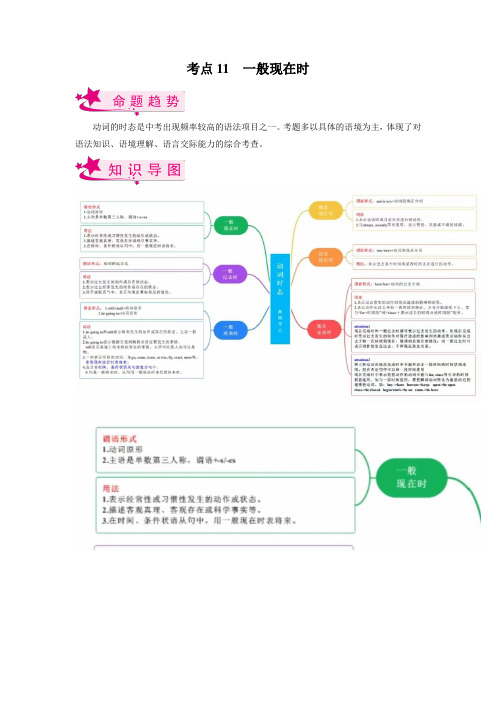
考点11 一般现在时动词的时态是中考出现频率较高的语法项目之一。
考题多以具体的语境为主,体现了对语法知识、语境理解、语言交际能力的综合考查。
1. 一般现在时的用法;2. 一般现在时的构成。
考向一:一般现在时的用法①表示经常性、习惯性的动作或存在的状态。
常与频度副词连用。
I often take a walk in the park. 我经常在公园散步。
These T-shirts are new. 这些T恤衫是新的。
②表示客观事实、真理。
The sun rises in the east and sets in the west. 太阳东升西落。
③在时间、条件状语从句中表示将来的动作。
If it doesn’t rain tomorrow, I will go bike riding in the open air. 如果明天不下雨,我将在户外骑自行车。
I’ll tell her the good news when she comes back. 当她回来的时候,我将把这个好消息告诉她。
④表示按计划或安排将要发生的动作,可用一般现在时表将来。
但只限于start,begin,leave,go,come,arrive,return,take place等。
考向二:一般现在时的构成在一般情况下用动词原形,若主语为第三人称单数,一般在动词原形后加-s或-es。
情况构成方法例词一般情况直接加-s read→reads love→loves以s,o,x,ch,sh结尾加-espass→passes box→boxes teach→teaches wash→washes以辅音字母+ y结尾将y变为i,再加-es carry→carries study→studies 不规则变化have→has be→am/is/are1.The teacher told us that the earth ________ around the sun.A.moved B.moves C.had moved D.was moving【答案】B【详解】句意:老师告诉过我们地球围着太阳转。
小升初英语复习专题——时态(含答案)

6.have h__a_s_____ 7.see _s_e_e__s___ 8.come c_o_m__e_s___ 9.watch w_a__tc__h_e_s_ 10.eat _e_a__ts____
ha_v_i_n__g___
se__e_in__g___ co_m__i_n_g___ w__a_t_c_h_i_n_g e_ating_______
行
他).
时
一般疑问句:Am/Is/Are+主语
Is he watching TV now? 他现在在看电视吗?
+动词-ing(+其他)?
2.现在进行时的基本用法 用法
例句
当句子中有 now 时,常表示动作正在进行, 这时要用现在进行时。
They are dancing now. 他们现在正在跳舞。
is going/will go
【解析】 解答此类题要抓住关键词。 第1题中关键词为now,应用现在进行时,又因主语为I,be动词应 用am。 第2题由yesterday morning可知应用过去时,get的过去式为got。 第3题由sometimes可知应用一般现在时,Tom为第三人称单数,应 用help的第三人称单数helps。 第4题由next week可知应用将来时,将来时有两种情势“be going to”与“will+动词原形”。
我明天去。
Will he come? 他(会)来吗?
Where shall we meet? 我们在哪见面?Fra bibliotek单项选择。
( )1.—Does Lucy watch TV every evening? —________. A.Yes, he does B.Yes, he doesn't C.Yes, she does D.No, she does
动词的一般现在时——中考专题复习
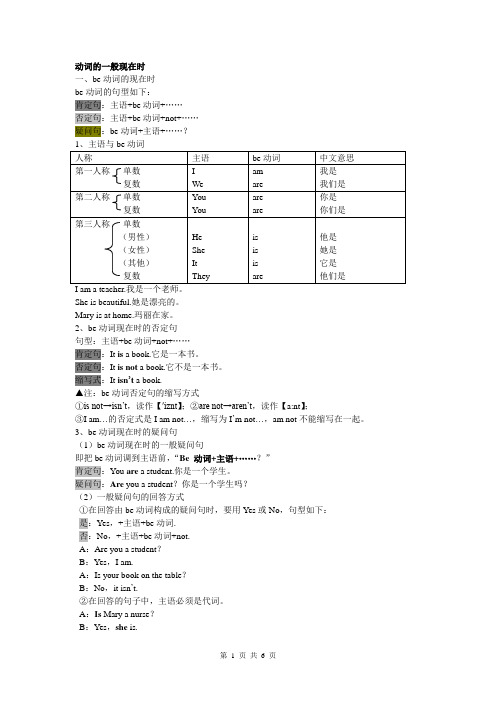
动词的一般现在时一、be动词的现在时be动词的句型如下:肯定句:主语+be动词+……否定句:主语+be动词+not+……疑问句:be动词+主语+……?I am a teacher.我是一个老师。
She is beautiful.她是漂亮的。
Mary is at home.玛丽在家。
2、be动词现在时的否定句句型:主语+be动词+not+……肯定句:It is a book.它是一本书。
否定句:It is not a book.它不是一本书。
缩写式:It isn’t a book.▲注:be动词否定句的缩写方式①is not→isn’t,读作【′iznt】;②are not→aren’t,读作【a:nt】;③I am…的否定式是I am not…,缩写为I’m not…,am not不能缩写在一起。
3、be动词现在时的疑问句(1)be动词现在时的一般疑问句即把be动词调到主语前,“Be 动词+主语+……?”肯定句:You are a student.你是一个学生。
疑问句:Are you a student?你是一个学生吗?(2)一般疑问句的回答方式①在回答由be动词构成的疑问句时,要用Yes或No,句型如下:是:Yes,+主语+be动词.否:No,+主语+be动词+not.A:Are you a student?B:Yes,I am.A:Is your book on the table?B:No,it isn’t.②在回答的句子中,主语必须是代词。
A:Is Mary a nurse?B:Yes,she is.(3)be动词现在时的特殊疑问句用what和who等疑问词和be动词构成的问句称特殊疑问句。
What用在问句“……是什么?”,Who用在问句“……是谁?”。
What和Who的句型是:What/Who+be动词+主语+……?A:What are they?他们是干什么的?B:They are workers.他们是工人。
(文末附答案)2023年高中英语复习一般现在时时态必考知识点归纳
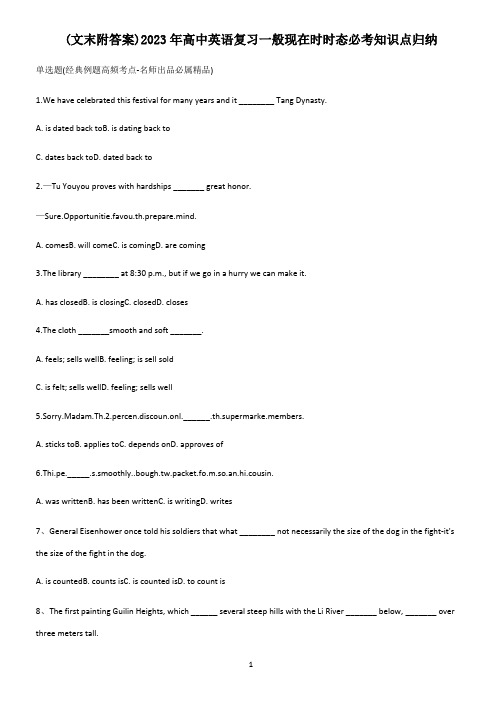
(文末附答案)2023年高中英语复习一般现在时时态必考知识点归纳单选题(经典例题高频考点-名师出品必属精品)1.We have celebrated this festival for many years and it ________ Tang Dynasty.A. is dated back toB. is dating back toC. dates back toD. dated back to2.—Tu Youyou proves with hardships _______ great honor.—Sure.Opportunitie.favou.th.prepare.mind.A. comesB. will comeC. is comingD. are coming3.The library ________ at 8:30 p.m., but if we go in a hurry we can make it.A. has closedB. is closingC. closedD. closes4.The cloth _______smooth and soft _______.A. feels; sells wellB. feeling; is sell soldC. is felt; sells wellD. feeling; sells well5.Sorry.Madam.Th.2.percen.discoun.onl.______.th.supermarke.members.A. sticks toB. applies toC. depends onD. approves of6.Thi.pe._____.s.smoothly..bough.tw.packet.fo.m.so.an.hi.cousin.A. was writtenB. has been writtenC. is writingD. writes7、General Eisenhower once told his soldiers that what ________ not necessarily the size of the dog in the fight-it's the size of the fight in the dog.A. is countedB. counts isC. is counted isD. to count is8、The first painting Guilin Heights, which ______ several steep hills with the Li River _______ below, _______ over three meters tall.A. focuses on; flowing; measuresB. focuses on; flows; measuringC. focusing on; flowing; measuresD. focusing on; flows; measuring9、My mother often_______ after supper with my sister .A. is taking a walkB. take walkC. takes walksD. takes a walk10、—Have you found anything useful?—None of the information ________ particularly useful to me.A. isB. areC. haveD. has11.Good amounts of sleep every night______ also important for your health.A. areB. isC. wasD. were12.The writer and professor, who I often refer to at the meetings, ________ famous for those works.A. isB. areC. had beenD. were13.Only after the war in the Syrian Arab Republic is over a peaceful life there.A. did people liveB. people livedC. people can liveD. can people live14.If you can do these things by the time you ________ college, you’ll do well in the test of college life.A. will go toB. went toC. go toD. have gone to15.Although the city a good look in general, some of its heritage was destroyed in World War II.A. had preservesB. preservedC. preservesD. will preserve16.Th.plan._______.of.a.10:00.Tha.is.i._______.i.te.minutes.A. takes; is leavingB. taking; is leavingC. is taking; leavesD. is taking; is leaving17、Matter is anything ______.A. that take up space and have weightB. which take up space and have weightC. that takes up space and has weightD. those take up space and have weight18、I will tell him as soon as he _________ hack.A. comeB. comesC. will comeD. came19、Two thirds of the earth's surface ________covered by water.A. isB. areC. wasD. were20、B.th.tim.Ro.____.bac.t.ou.rescue.mos.o.u.wil.hav.bee.washe.awa.b.th.flood.W.mus.tak..quic.measur.t.leav.her.a.soo.a .possible.A. comeB. comesC. cameD. will come21.Every student and every teacher____ who it is that is_______ for the breaking of the door of the classroom.A. know; to blameB. knows; to blameC. knows; to be blamedD. would know; blamed22.The Spring Festival is the time of year that _____ the largest annual mass migration on the planet when one sixth of the world’s population _____ home.A. will see; travelsB. saw; was travellingC. will be seeing; will be travellingD. sees; travel23.Every Wednesday, we work at a soup kitchen and________ homeless people in the community.A. hand out food withB. hand in food withC. hand in food toD. hand out food to24.If it ___ rain tomorrow, we’ll go hiking.A. won’tB. doesn’tC. didn’t25.---Would you like to climb the hill with us tomorrow?---If it ___________, I ___________.A. doesn't rain; will goB. won't rain; will goC. don't rain; goD. doesn't rain; go26.It is a long and broad street, on each side of which ________a lot of trees.A. growsB. growC. are growingD. has grown27、I regret _______ that I’m busy ______ my lesso ns.A. to say; to prepareB. to say; preparingC. saying; to prepareD. saying; preparing28、We________ a dinner at seven o’clock tomorrow, when CCTV________ a to broadcast news.A. are having; will startB. will be having; startsC. have; will startD. will have had; starts29、—Do you like the new pen?—Yes, it________ very well.A. is writtenB. was writtenC. wroteD. writes30、The writer and poet________ to give us a speech on English study next week.A. areB. isC. wasD. will be完成句子(经典例题高频考点-名师出品必属精品)31.我容易相处并喜欢交朋友, 我认为这对我的工作很有帮助。
一般现在时复习
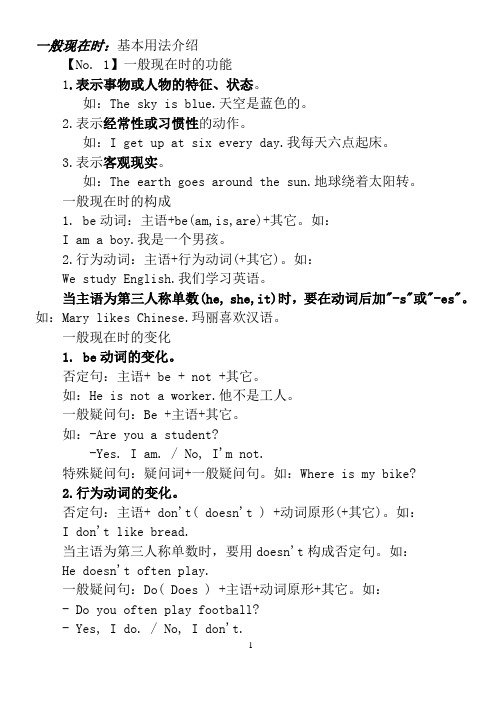
一般现在时:基本用法介绍【No. 1】一般现在时的功能1.表示事物或人物的特征、状态。
如:The sky is blue.天空是蓝色的。
2.表示经常性或习惯性的动作。
如:I get up at six every day.我每天六点起床。
3.表示客观现实。
如:The earth goes around the sun.地球绕着太阳转。
一般现在时的构成1. be动词:主语+be(am,is,are)+其它。
如:I am a boy.我是一个男孩。
2.行为动词:主语+行为动词(+其它)。
如:We study English.我们学习英语。
当主语为第三人称单数(he, she,it)时,要在动词后加"-s"或"-es"。
如:Mary likes Chinese.玛丽喜欢汉语。
一般现在时的变化1. be动词的变化。
否定句:主语+ be + not +其它。
如:He is not a worker.他不是工人。
一般疑问句:Be +主语+其它。
如:-Are you a student?-Yes. I am. / No, I'm not.特殊疑问句:疑问词+一般疑问句。
如:Where is my bike?2.行为动词的变化。
否定句:主语+ don't( doesn't ) +动词原形(+其它)。
如:I don't like bread.当主语为第三人称单数时,要用doesn't构成否定句。
如:He doesn't often play.一般疑问句:Do( Does ) +主语+动词原形+其它。
如:- Do you often play football?- Yes, I do. / No, I don't.当主语为第三人称单数时,要用does构成一般疑问句。
如:- Does she go to work by bike?- Yes, she does. / No, she doesn't.特殊疑问句:疑问词+一般疑问句。
中考语法复习 — 一般现在时(附真题及解析)
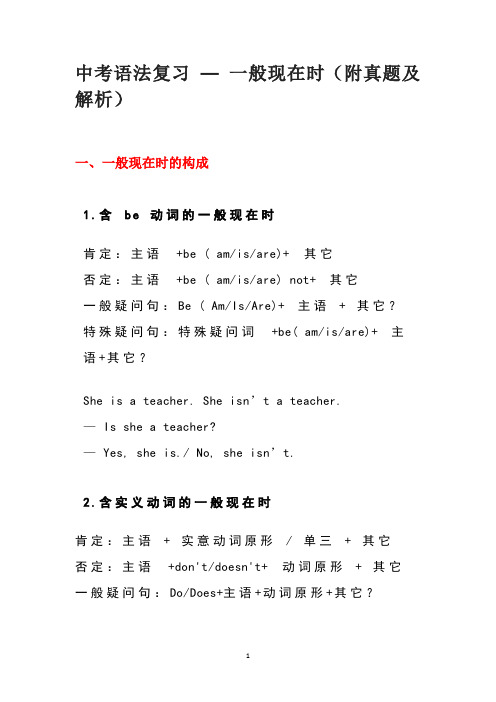
中考语法复习— 一般现在时(附真题及解析)一、一般现在时的构成1.含b e动词的一般现在时肯定:主语+be ( am/is/are)+其它否定:主语+be ( am/is/are) not+其它一般疑问句:Be ( Am/Is/Are)+主语+其它?特殊疑问句:特殊疑问词+be( am/is/are)+主语+其它?She is a teacher. She isn’t a teacher.— Is she a teacher?— Yes, she is./ No, she isn’t.2.含实义动词的一般现在时肯定:主语+实意动词原形/单三+其它否定:主语+don't/doesn't+动词原形+其它一般疑问句:Do/Does+主语+动词原形+其它?特殊疑问句:特殊疑问词+d o/d o e s+主语+动词原形+其它?Helen works hard.Helen doesn't work hard.— Does Helen work hard?— Yes, she does./No, she doesn't.How does Helen work?注意:在一般现在时的结构中,动词的形式由主语的单复数决定。
主语是第一人称或复数时,谓语动词用其原形;主语是第三人称单数时,谓语动词用单三形式。
现将动词单三的规则变化及其读音总结如下:二一般现在时的用法1.表示经常性或习惯性的动作,常与表示频度的时间状语连用。
如:My grandparents always take a walk in the park after supper.2.表示客观真理、客观存在以及科学事实。
The speed of light is faster than the speed of sound.光速比声速快。
3.用在表示格言或警句中。
Where there is a will, there is a way.有志者事竟成。
最新复习专题——一般现在时知识点归纳经典
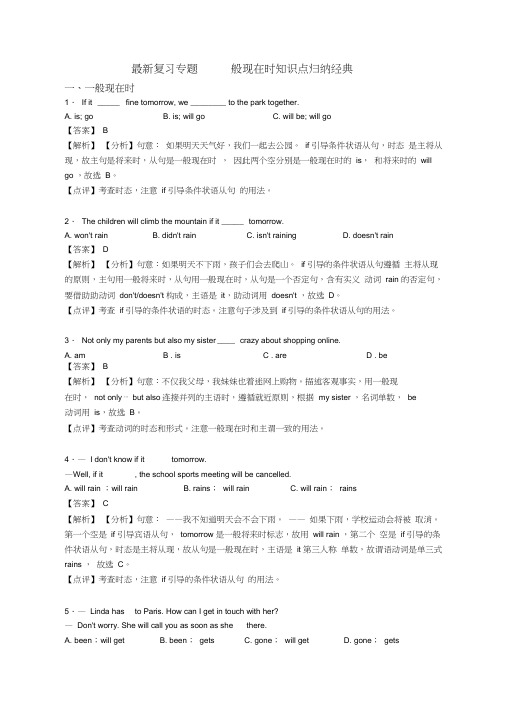
最新复习专题般现在时知识点归纳经典一、一般现在时1.If it _____ fine tomorrow, we ________ to the park together.A. is; goB. is; will goC. will be; will go【答案】B【解析】【分析】句意:如果明天天气好,我们一起去公园。
if 引导条件状语从句,时态是主将从现,故主句是将来时,从句是一般现在时,因此两个空分别是一般现在时的is,和将来时的will go ,故选B。
【点评】考查时态,注意if 引导条件状语从句的用法。
2.The children will climb the mountain if it _____ tomorrow.A. won't rainB. didn't rainC. isn't rainingD. doesn't rain【答案】D【解析】【分析】句意:如果明天不下雨,孩子们会去爬山。
if 引导的条件状语从句遵循主将从现的原则,主句用一般将来时,从句用一般现在时,从句是一个否定句,含有实义动词rain 的否定句,要借助助动词don't/doesn't 构成,主语是it,助动词用doesn't ,故选D。
【点评】考查if 引导的条件状语的时态。
注意句子涉及到if 引导的条件状语从句的用法。
3.Not only my parents but also my sister ____ crazy about shopping online.A. am B . is C . are D . be【答案】B【解析】【分析】句意:不仅我父母,我妹妹也着迷网上购物。
描述客观事实,用一般现在时,not only ⋯but also连接并列的主语时,遵循就近原则,根据my sister ,名词单数,be动词用is,故选B。
【点评】考查动词的时态和形式。
一般现在时——高考英语重点时态语态满分攻略
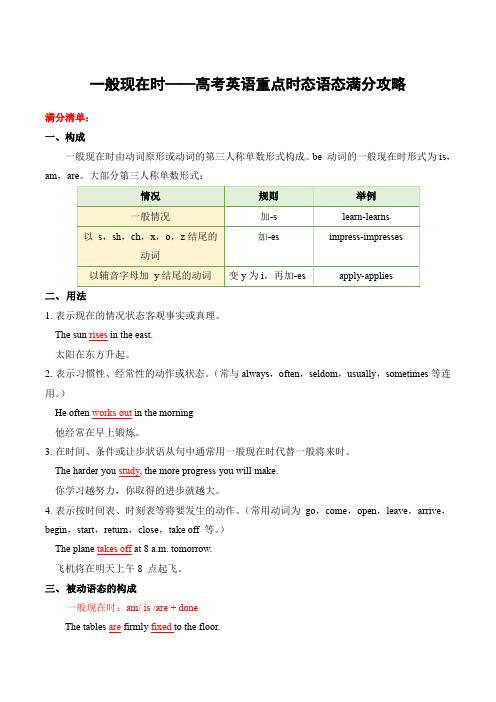
一般现在时——高考英语重点时态语态满分攻略满分清单:一、构成一般现在时由动词原形或动词的第三人称单数形式构成。
be 动词的一般现在时形式为is,am,are。
大部分第三人称单数形式:二、用法1.表示现在的情况状态客观事实或真理。
The sun rises in the east.太阳在东方升起。
2.表示习惯性、经常性的动作或状态。
(常与always,often,seldom,usually,sometimes等连用。
)He often works out in the morning他经常在早上锻炼。
3.在时间、条件或让步状语从句中通常用一般现在时代替一般将来时。
The harder you study, the more progress you will make.你学习越努力,你取得的进步就越大。
4.表示按时间表、时刻表等将要发生的动作。
(常用动词为go,come,open,leave,arrive,begin,start,return,close,take off 等。
)The plane takes off at 8 a.m. tomorrow.飞机将在明天上午8 点起飞。
三、被动语态的构成一般现在时:am/ is /are + doneThe tables are firmly fixed to the floor.这些桌子被牢牢地固定在地板上。
满分练习:1. Neither your sister nor mine _____the good news. Let's tell them.A. knowB. knowsC. knewD. known2. Our collective ability to be resilient and successful is held back, because we ________ a period of recovery.A. lack ofB. are in lack ofC. lackD. are lacking of3. Mike _______ very hard. When I saw him at eleven last night, he was still studying in his room.A. has studiedB. studiesC. studiedD. will study4. The plane ______ at 10:00 according to the schedule, so you must try to be at the airport by 9: 00.A. is being taken offB. will take offC. took offD. takes off5. He will have learned the guitar for eight years by the time he ________ from the university next year.A. will graduateB. graduatesC. will have graduatedD. is to graduate6. —What a large collection!—Believe it or not, my interest in stamp collecting _____ primary school days.A. dates fromB. dated back toC. dating back toD. was dated from7. Single-use plastic bags are used at most a few times before they ________ away.A. are thrownB. have thrownC. were thrownD. thrown8. Our class ________ 55 lively boys and girls, and Mr. Yu is strict with each of us.A. makes upB. is made up ofC. is built upD. builds up9. All customers _______ to take their temperatures when they enter the supermarket.A. is askedB. was askedC. are askedD. were asked10. —So what is the procedure?—All the applicants _______ before a final decision is made by the authority.A. interviewB. are interviewingC. are interviewedD. are being interviewed11. There's a system where the waste _____ (dispose) of using the principles of ecology.12. To go to bed early and get up early _____ (make) a man healthy, wealthy and wise.13. I prefer to go to the mall near the post office, because the furniture there _____ (be) much cheaper.14. The project is _____ (schedule) to start on in Guangzhou City.15. At the Cold Food Festival, the use of fire _____ (ban) and people only eat cold food to mark the death of Jie Zitui.答案以及解析1. 答案:B解析:考查主谓一致和一般现在时。
一般现在时 复习经典
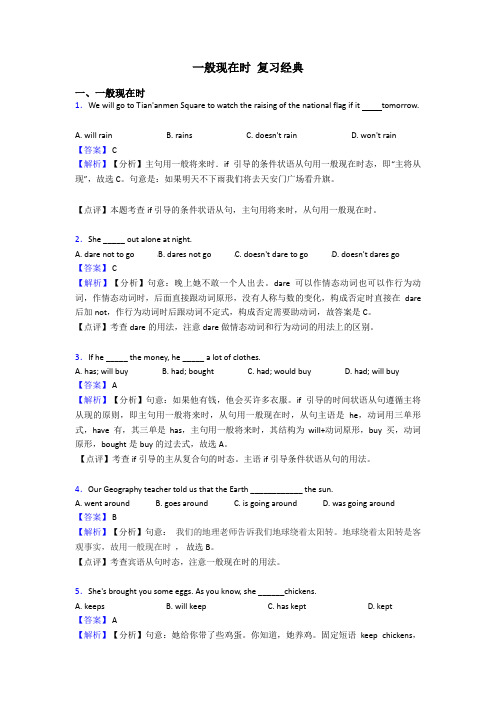
一般现在时复习经典一、一般现在时1.We will go to Tian'anmen Square to watch the raising of the national flag if it tomorrow.A. will rainB. rainsC. doesn't rainD. won't rain【答案】 C【解析】【分析】主句用一般将来时.if引导的条件状语从句用一般现在时态,即“主将从现”,故选C。
句意是:如果明天不下雨我们将去天安门广场看升旗。
【点评】本题考查if 引导的条件状语从句,主句用将来时,从句用一般现在时。
2.She _____ out alone at night.A. dare not to goB. dares not goC. doesn't dare to goD. doesn't dares go【答案】 C【解析】【分析】句意:晚上她不敢一个人出去。
dare可以作情态动词也可以作行为动词,作情态动词时,后面直接跟动词原形,没有人称与数的变化,构成否定时直接在dare 后加not,作行为动词时后跟动词不定式,构成否定需要助动词,故答案是C。
【点评】考查dare的用法,注意dare做情态动词和行为动词的用法上的区别。
3.If he _____ the money, he _____ a lot of clothes.A. has; will buyB. had; boughtC. had; would buyD. had; will buy【答案】 A【解析】【分析】句意:如果他有钱,他会买许多衣服。
if引导的时间状语从句遵循主将从现的原则,即主句用一般将来时,从句用一般现在时,从句主语是he,动词用三单形式,have有,其三单是has,主句用一般将来时,其结构为will+动词原形,buy买,动词原形,bought是buy的过去式,故选A。
动词时态复习一般现在时和一般过去时
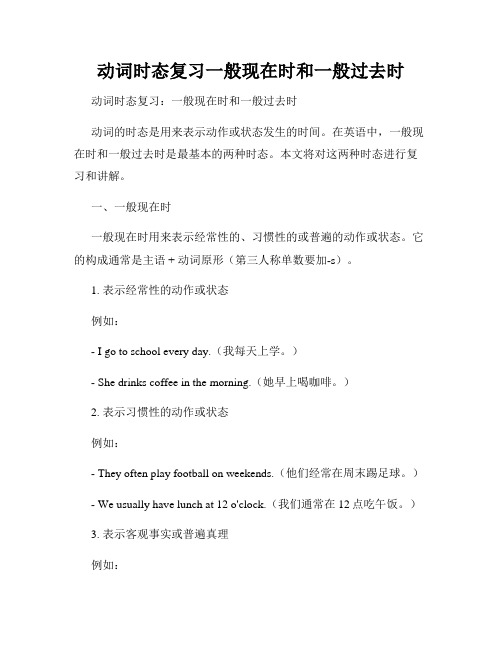
动词时态复习一般现在时和一般过去时动词时态复习:一般现在时和一般过去时动词的时态是用来表示动作或状态发生的时间。
在英语中,一般现在时和一般过去时是最基本的两种时态。
本文将对这两种时态进行复习和讲解。
一、一般现在时一般现在时用来表示经常性的、习惯性的或普遍的动作或状态。
它的构成通常是主语 + 动词原形(第三人称单数要加-s)。
1. 表示经常性的动作或状态例如:- I go to school every day.(我每天上学。
)- She drinks coffee in the morning.(她早上喝咖啡。
)2. 表示习惯性的动作或状态例如:- They often play football on weekends.(他们经常在周末踢足球。
)- We usually have lunch at 12 o'clock.(我们通常在12点吃午饭。
)3. 表示客观事实或普遍真理例如:- The sun rises in the east.(太阳从东方升起。
)- Water boils at 100 degrees Celsius.(水在100摄氏度沸腾。
)二、一般过去时一般过去时用来表示过去发生的动作或状态。
它的构成通常是主语+ 动词过去式。
1. 表示过去的动作或状态例如:- I visited my grandparents last weekend.(上周末我去看望了我的祖父母。
)- She studied English for three hours yesterday.(昨天她学了三个小时英语。
)2. 表示过去的经常性动作或状态例如:- When I was a child, I played with my friends every day.(我小时候,我每天都和朋友们一起玩。
)- We lived in that house for five years.(我们在那个房子里住了五年。
复习专题一般现在时难题及答案
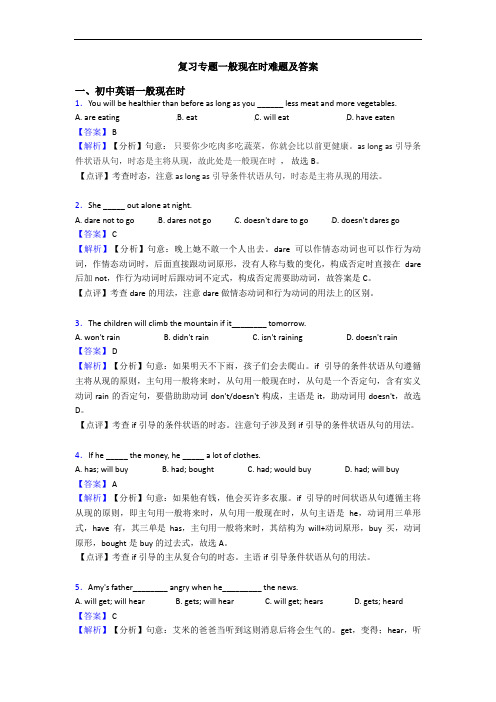
复习专题一般现在时难题及答案一、初中英语一般现在时1.You will be healthier than before as long as you ______ less meat and more vegetables.A. are eatingB. eatC. will eatD. have eaten【答案】 B【解析】【分析】句意:只要你少吃肉多吃蔬菜,你就会比以前更健康。
as long as引导条件状语从句,时态是主将从现,故此处是一般现在时,故选B。
【点评】考查时态,注意as long as引导条件状语从句,时态是主将从现的用法。
2.She _____ out alone at night.A. dare not to goB. dares not goC. doesn't dare to goD. doesn't dares go【答案】 C【解析】【分析】句意:晚上她不敢一个人出去。
dare可以作情态动词也可以作行为动词,作情态动词时,后面直接跟动词原形,没有人称与数的变化,构成否定时直接在dare 后加not,作行为动词时后跟动词不定式,构成否定需要助动词,故答案是C。
【点评】考查dare的用法,注意dare做情态动词和行为动词的用法上的区别。
3.The children will climb the mountain if it________ tomorrow.A. won't rainB. didn't rainC. isn't rainingD. doesn't rain【答案】 D【解析】【分析】句意:如果明天不下雨,孩子们会去爬山。
if 引导的条件状语从句遵循主将从现的原则,主句用一般将来时,从句用一般现在时,从句是一个否定句,含有实义动词rain的否定句,要借助助动词don't/doesn't构成,主语是it,助动词用doesn't,故选D。
小升初语法复习-一般现在时(讲义)人教PEP版英语六年级下册
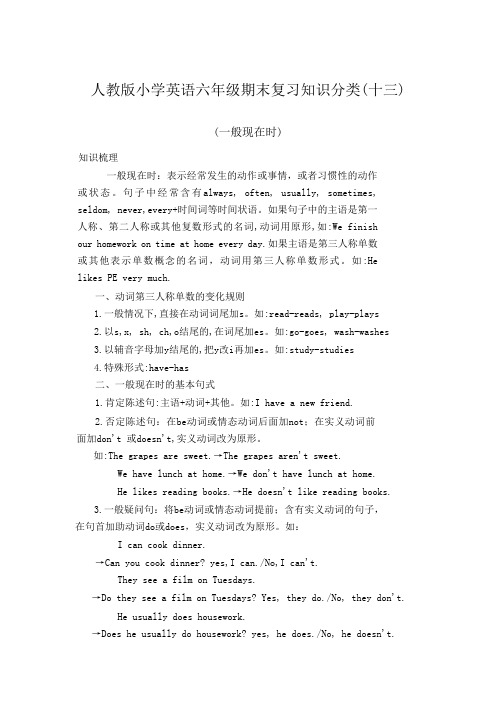
人教版小学英语六年级期末复习知识分类(十三)(一般现在时)知识梳理一般现在时:表示经常发生的动作或事情,或者习惯性的动作或状态。
句子中经常含有always, often, usually, sometimes, seldom, never,every+时间词等时间状语。
如果句子中的主语是第一人称、第二人称或其他复数形式的名词,动词用原形,如:We finishour homework on time at home every day.如果主语是第三人称单数或其他表示单数概念的名词,动词用第三人称单数形式。
如:Helikes PE very much.一、动词第三人称单数的变化规则1.一般情况下,直接在动词词尾加s。
如:read-reads, play-plays2.以s,x, sh, ch,o结尾的,在词尾加es。
如:go-goes, wash-washes3.以辅音字母加y结尾的,把y改i再加es。
如:study-studies4.特殊形式:have-has二、一般现在时的基本句式1.肯定陈述句:主语+动词+其他。
如:I have a new friend.2.否定陈述句:在be动词或情态动词后面加not;在实义动词前面加don't 或doesn't,实义动词改为原形。
如:The grapes are sweet.→The grapes aren't sweet.We have lunch at home.→We don't have lunch at home.He likes reading books.→He doesn't like reading books.3.一般疑问句:将be动词或情态动词提前;含有实义动词的句子,在句首加助动词do或does,实义动词改为原形。
如:I can cook dinner.→Can you cook dinner? yes,I can./No,I can't.They see a film on Tuesdays.→Do they see a film on Tuesdays? Yes, they do./No, they don't.He usually does housework.→Does he usuall y do housework? yes, he does./No, he doesn't.4.特殊疑问句:特殊疑问词+一般疑问句?如:He likes reading books.→What does he like?The children are from China.→Where are the children from?练习检测一、写出下列动词的第三人称单数形式。
中考英语复习实义动词的一般现在时
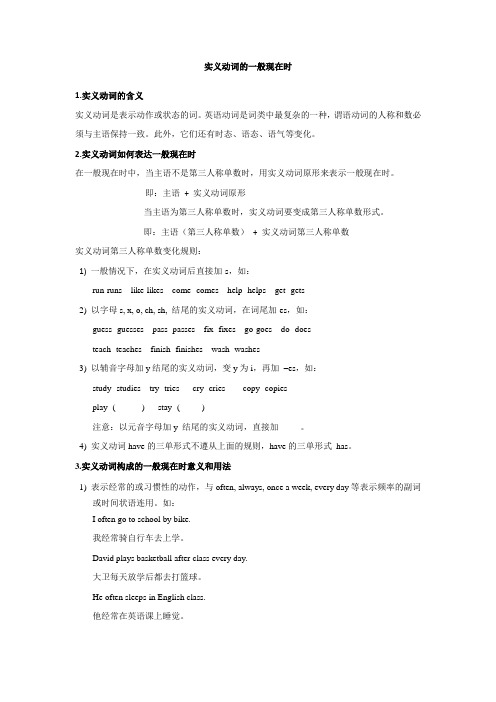
实义动词的一般现在时1.实义动词的含义实义动词是表示动作或状态的词。
英语动词是词类中最复杂的一种,谓语动词的人称和数必须与主语保持一致。
此外,它们还有时态、语态、语气等变化。
2.实义动词如何表达一般现在时在一般现在时中,当主语不是第三人称单数时,用实义动词原形来表示一般现在时。
即:主语+ 实义动词原形当主语为第三人称单数时,实义动词要变成第三人称单数形式。
即:主语(第三人称单数)+ 实义动词第三人称单数实义动词第三人称单数变化规则:1) 一般情况下,在实义动词后直接加-s,如:run-runs like-likes come- comes help- helps get- gets2) 以字母s, x, o, ch, sh, 结尾的实义动词,在词尾加-es,如:guess- guesses pass- passes fix- fixes go-goes do- doesteach- teaches finish- finishes wash- washes3) 以辅音字母加y结尾的实义动词,变y为i,再加–es,如:study- studies try- tries cry- cries copy- copiesplay- ( ) stay- ( )注意:以元音字母加y 结尾的实义动词,直接加_____。
4) 实义动词have的三单形式不遵从上面的规则,have的三单形式has。
3.实义动词构成的一般现在时意义和用法1) 表示经常的或习惯性的动作,与often, always, once a week, every day等表示频率的副词或时间状语连用。
如:I often go to school by bike.我经常骑自行车去上学。
David plays basketball after class every day.大卫每天放学后都去打篮球。
He often sleeps in English class.他经常在英语课上睡觉。
- 1、下载文档前请自行甄别文档内容的完整性,平台不提供额外的编辑、内容补充、找答案等附加服务。
- 2、"仅部分预览"的文档,不可在线预览部分如存在完整性等问题,可反馈申请退款(可完整预览的文档不适用该条件!)。
- 3、如文档侵犯您的权益,请联系客服反馈,我们会尽快为您处理(人工客服工作时间:9:00-18:30)。
一般现在时一、一般现在时用法1. 表示经常性,反复性,重复性,习惯性,永久性的动作或存在的状态.They usually go to school by bike.I take the medicine three times a day.She helps her mother once a week.Mary’s father is a policeman.There are 50 students in my class.2. 表示客观真理,科学原理,自然现象,等客观事实或格言,谚语等。
The sun rises in the east and sets in the west every day.The man who has never been to the Great Wall is not a real man.Tomorrow is Tuesday.3. 一般现在时表将来1)下列动词come, go, arrive, leave, start, begin, return的一般现在时可以表示将来,主要用来表示在时间上已确定或安排好的事情。
例如:a.The train leaves at six tomorrow morning. 火车明天上午六点开。
b.When does the bus star? It stars in ten minutes. 汽车什么时候开?十分钟后。
2)以here, there等开始的倒装句,表一般现在时可以示动作正在进行。
例如:a.Here comes the bus. = The bus is coming. 车来了。
b.There goes the bell. = The bell is ringing. 铃响了。
3)在时间或条件句中,主句是一般将来时,从句用一般现在时表将来。
例如:a.When Bill comes (不是will come), ask him to wait for me. 比尔来后,让他等我。
b.I'll write to you as soon as I arrive there. 我到了那里,就写信给你。
4)在动词hope, take care that, make sure that等的宾语从句中,一般现在时可以表示将来。
例如:a.I hope they have a nice time next week. 我希望他们下星期玩得开心。
b.Make sure that the windows are closed before you leave the room. 离开房间前,务必把窗户关了。
5). 用现在进行时表示将来下列动词come, go, arrive, leave, start, begin, return等现在进行时可以表示将来。
例如:a.I'm leaving tomorrow. 明天我要走了。
b.Are you staying here till next week? 你会在这儿呆到下周吗?二、句子结构单三主语+ 动词(单三形式)其他主语+ 动词原形三、标志性的时间状语通常与副词sometimes, often, usually, always, every day (year, month ), once (twice, three times) a day, at …在几点钟等时间状语连用。
只有在第三人称单数用动词的“三单变化”,其他用动词的原形。
三单变化:1.多数在动词后+s play —plays like —likes(1)直接在动词词尾加-s.ask---asks work---works get---gets stay---stays (2)以字母s, x, ch, sh或o结尾的动词,在词尾直接加-es.watch---watches wish---wishes fix---fixes do---does go---goes pass---passes(3)以“辅音字母加- y”结尾的动词,要先变y为i再加-estry---tries study---studies cry---cries fly---flies2.不规则变化:be---- is are have----has四、一般现在时的句子转换:在一般现在时中,当主语是第三人称单数时,谓语动词要用第三人称单数形式,即常在动词原形后加-s或-es。
但有些同学们对于哪些主语是第三人称单数还不十分清楚,现归纳总结如下:1、人称代词he, she, it是第三人称单数。
如:He likes watching TV. 他喜欢看电视。
She has lunch at twelve. 她十二点吃午餐。
It looks like a cat. 它看起来像只猫。
2、单个人名、地名或称呼作主语;是第三人称单数。
如:①Han Mei looks like her mother. 韩梅看起来像她的母亲。
②Beijing is in China. 北京在中国。
③Uncle Wang often makes cakes. 王叔叔经常做蛋糕。
3、单数可数名词或"this / that / the+单数可数名词"作主语时,是第三人称单数。
如:①A horse is a useful animal. 马是有用的动物。
②This book is yours. 这本书是你的。
③That car is red. 那辆小汽车是红色的。
④The cat is Lucy's. 这只猫是露茜的。
4、不定代词someone, somebody, nobody, everything, something等及指示代词this, that作主语时,是第三人称单数。
如:①Everyone is here. 大家到齐了。
②There is something wrong with the watch. 这块手表有毛病。
③This is a pen. 这是一支钢笔。
④That is an eraser. 那是一块橡皮擦。
5、不可数名词作主语时为第三人称单数。
如:①The milk is in the glass. 牛奶在玻璃杯里。
②The bread is very small. 那面包很小。
六、当数字或字母作主语时,看作第三人称单数。
如:①"6" is a lucky number. "6"是个吉利数字。
②"I" is a letter. "I"是个字母。
句子转换:变化规则(1)当句子中有be动词或情态动词时,则把be动词或情态动词(can,could等等)提到主语的前面变成疑问句;在be动词或情态动词后面加not变成否定句.例:①陈述句:She is a student.疑问句→Is she a student?否定句→She is not a student.②陈述句:I can swim.疑问句→Can you swim否定句→I can not swim.(2)当句子中即没有be动词,也没有情态动词时,则在主语前加助动词do (you,以及复数), does(单数she,he,it)变成问句;在主语后谓语动词前加助动词don’t(I,you,以及复数), doesn’t(单数she,he,it)变成否定句,助动词后的动词要变成动词原形。
例:①陈述句:We get up at 7:00 every morning.疑问句→Do you get up at 7:00 every morning?否定句→We don’t get up at 7:00 every morning.②陈述句:She has a little brother.疑问句→Does she have a little brother?否定句→She doesn’t have a little brother巩固练习题:一、按照要求改写句子1.This is my pencil ? (变一般疑问句) your pencil ?2. These red socks are Kate’s . (变一般疑问句)socks Kate’s ?3. I want to buy a big green bag . (变特殊疑问句you want to buy ?4. Mary does not have any books . (变肯定句)Mary books .5. The clothing shop is on sale . (变为否定句)6. She likes the black bag very much . (变为否定句)7. I buy the pants for only 50 Yuan. (用she改写句子)the pants for only 50 Yuan.8. It’s an English dictionary . (对画线部分提问)9. Lily and Lucy are fifteen years old now . (对画线部分提问)Lily and Lucy ?10. Her dog is 2 years and 5 months old . (变为否定句)Her dog 2 years and 5 months old .11. I usually get up at seven o’clock . (用he改写句子)at seven o’clock .12. He often has hamburger and apples for dinner . (变为一般疑问句)13. My family always like thrillers . (对画线部分提问)your family always like ?14. Jane’s sister wants to see the comedy . (变为一般疑问句)Jane’s sister to see the comedy ?15. Maria and Jack come to this school on Monday .(对画线部分提问)Maria and Jack come to this school ?二、完成句子1. 他每天六点钟起床。
He ______ _____ _______ six every morning.2. 小明经常去远足。
Xiao Ming _________ ________ hiking.3. 她总是在星期天看望爷爷奶奶。
